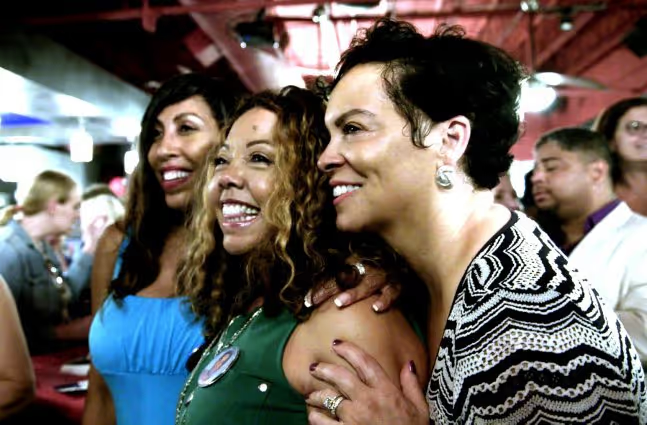And She Could Be Next (Episode 1): The New American Majority Resources & Standards
Resources & Standards

Helpful Sources
- Ballotpedia.org: Who represents me? (website)
- Ashley D. Farmer, Remaking Black Power: How Black Women Transformed an Era, 2017 (book)
- Gloria Anzaldúa, Borderlands/La Frontera: The New Mestiza, 1987 (book)
- Cherríe Moraga and Gloria Anzaldúa (Eds.), This Bridge Called My Back: Writings by Radical Women of Color, 1981 (book)
- Ian Haney López, Dog Whistle Politics: How Coded Racial Appeals Have Reinvented Racism and Wrecked the Middle Class, 2015 (book)
- Whose Streets? Film
- I Am Not Your Negro, film
- The origin of the term 'intersectionality' (website)
- Kimberle Crenshaw’s original 1991 article, “Mapping the Margins: Intersectionality, Identity Politics, and Violence against Women of Color” and podcast, “Intersectionality Matters!”
Resource List
Political Organizing Movements
- The New Georgia Project: Non-partisan group featured in And She Could Be Next that directs its efforts towards registering and civically engaging the rising electorate in the state of Georgia.
- UNITE HERE!: Labor union representing workers in the U.S. and Canadian hospitality, hotel, gaming, food service, airport, textile, manufacturing, distribution, laundry, and transportation industries.
- Border Network for Human Rights: A leading immigration reform and human rights advocacy organization based in El Paso, Texas. Organizers of the “Hugs Not Walls” initiative featured in And She Could Be Next.
- Run For Something: A non-profit that encourages, recruits, and supports young people to run for office.
- Justice Democrats: Progressive Congressional caucus that supports the campaigns of candidates in primary elections who commit to holding those on top accountable to the grassroots.
- Council on American-Islamic Relations (CAIR): Nonprofit, grassroots civil rights and advocacy organization. America’s largest Muslim civil liberties organization.
- Alianza Nacional de Campesinas: The first national women’s farm workers’ union in the U.S. Their mission is to unify the struggle to promote farm worker women’s leadership in a national movement to create a broader visibility and advocate for changes that ensure their human rights.
- When We All Vote
Standards
RH.11-12.2 Determine the central ideas or information of a primary or secondary source; provide an accurate summary that makes clear the relationships among the key details and ideas.
W.9--10.2d Use precise language and domain-specific vocabulary to manage the complexity of the topic.
W.11-12.2 Write informative/explanatory texts to examine and convey complex ideas, concepts and information clearly and accurately through the effective selection, organization and analysis of content.
SL.11--12.1 Initiate and participate effectively in a range of collaborative discussions (one-on-one, in groups and teacher-led) with diverse partners on grades 11-12 topics, texts and issues, building on others' ideas and expressing their own clearly and persuasively.
SL.11--12.2 Integrate multiple sources of information presented in diverse formats and media (e.g., visually, quantitatively, orally) in order to make informed decisions and solve problems, evaluating the credibility and accuracy of each source and noting any discrepancies among the data.
SL.11--12.3 Evaluate a speaker's point of view, reasoning and use of evidence and rhetoric, assessing the stance, premises, links among ideas, word choice, points of emphasis and tone used.
Social-Emotional Learning: Core SEL Competencies
- Self-awareness: Accurately recognize one’s own emotions, thoughts, and values and how they influence behavior.
- Social awareness: Take the perspective of and empathize with others, including those from diverse backgrounds and cultures.
- Responsible Decision Making: Realistically evaluate consequences of various actions, and consider the wellbeing of oneself and others.

